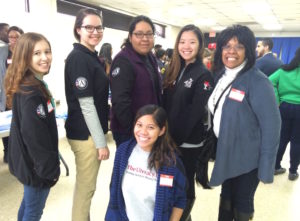What is a service year, and why should you consider applying for one? Carlie Muessig, a Recruitment Coordinator at The Literacy Lab, has spent the last few years answering these exact questions.
Following a year of service as a Literacy Lab tutor, Carlie joined our team to help share our mission and identify advocates for our work. In her conversations with AmeriCorps applicants and other service organizations, Carlie has developed an understanding of how a service year can fit into almost any career path and benefit young professionals and retirees alike.
By definition, what is a service year?
CM: A service year is a year-long commitment a person makes in pursuit of addressing a specific need through service. It’s an intentional way to support your community or a community you’re interested in joining. Many people engage in a service year after high school, college, retirement, or during a career transition.
How does a service year differ from traditional job experience?
One of the big differences is that there’s a specific deadline as to when a service year position ends, so you have to be intentional about making it what you want during that time. Because the monetary compensation is different from what you’ll receive at a traditional job, you have to be really committed to the work you’re doing. Completing a service year also provides a chance to network and make connections that could lead to a job in that field. It gives you some time to plan ahead and explore your next options.
How does a service year benefit career development or personal growth?
Networking opportunities are numerous in a service year, whether formal or informal. A service year also gives you a chance to demonstrate to future employers that you are able to commit to something, even if it requires hard work. You get experience tackling real-world challenges, taking initiative, and making a commitment to something for an extended period of time. Listing a service year on your resume is a great way to demonstrate these qualities to potential employers.

As far as personal growth, this experience gives you a chance to push yourself. During a service year, you might be in an unfamiliar situation or new city, and it gives you a chance to explore what you’re comfortable with or capable of. At the end of the year, you can look back and see that – even though it was challenging – you persevered and grew.
As an AmeriCorps alum, what was the biggest impact that your service year experience had on you?
I had always grown up thinking I wanted to be a classroom teacher, but working with my students during my service year with The Literacy Lab showed me that working one-on-one was the preferable setting for me. Seeing my students excel when given consistent and caring attention made me rethink the kind of impact that I want to have on people. I wanted to do something more holistic and interactive, which I do in my role on the recruitment team. I spend a lot of my time interviewing people and talking to people at career fairs. I like to talk to people about their career goals and make the connections about how a service year with The Literacy Lab can help them achieve those goals.
If you had to give one piece of advice to someone interested in a service year, what would it be?
Don’t think of it as a job. Think of it as a life experience that may lead you in the direction of your career path, and as something that will benefit you personally as much as it does professionally. You might also have to make some lifestyle adjustments and be thoughtful about finances as you commit to being of service to others for a year, so maintaining that mindset and ethic of service is important.
How would you pitch a service year to someone looking for a career outside of education?
This position is a great experience to build transferable skills for so many careers. For example, recently we’ve had a few tutors who are going on to a role in healthcare, specifically pediatrics. They want to have hands-on experience working with kids, and serving as a tutor opens a door for that experience. They can see the environments where potential patients might be coming from. That holistic view can inform healthcare practices. These tutors now have practical experience working with young kids and have already started to build relationships if they continue to work in the same community as a healthcare professional.